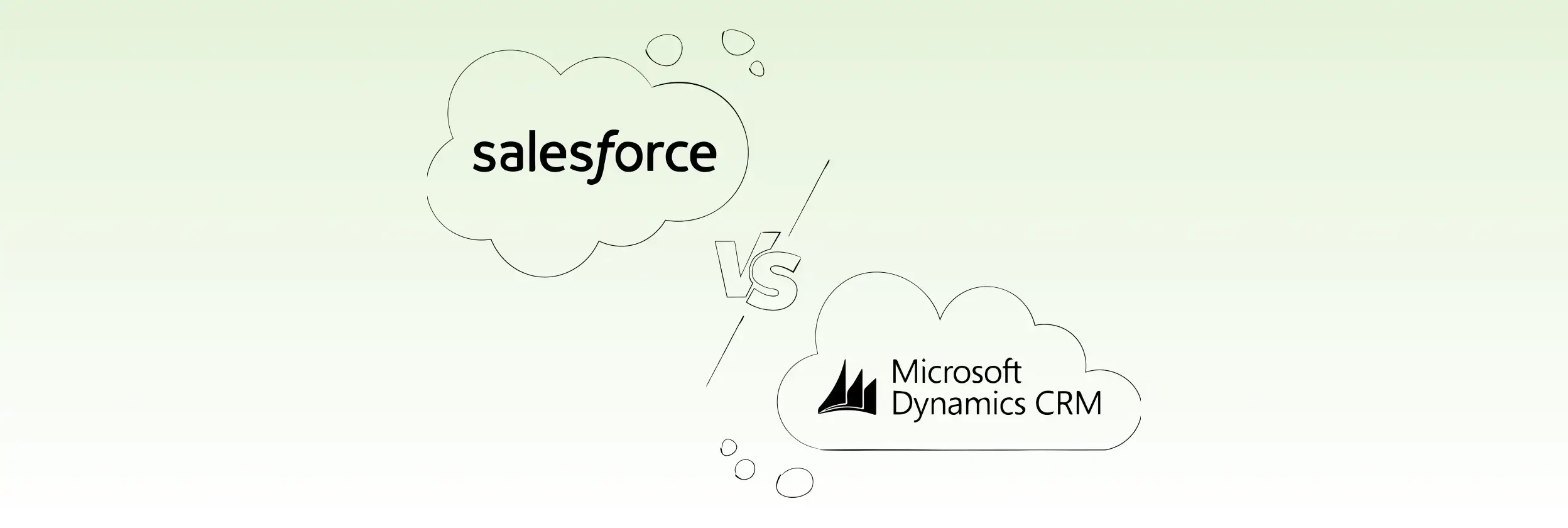Microsoft Dynamics CRM vs Salesforce: Which is the Best CRM in 2024?
Customer Relationship Management (CRM) software is essential for businesses of all sizes. It manages customer and leads interactions to improve customer relationships, increase sales, and drive business growth. There are many different options for CRM software, each with its strengths and weaknesses. This article will compare two popular CRM options, Salesforce and Microsoft Dynamics 365, to determine which CRM will better suit your business in 2024.
Microsoft Dynamics 365 and Salesforce are two of the leading CRM software solutions. While both platforms offer similar features, Microsoft Dynamics 365 over Salesforce has some key benefits. So, let’s find out precisely what these benefits are.
The key benefits of Microsoft Dynamics 365 over Salesforce
Integration with other Microsoft products and services
One of the significant benefits of Microsoft Dynamics 365 over Salesforce is its seamless integration with other Microsoft products and services, such as Office 365, SharePoint, and Power BI. This integration provides users with a familiar and consistent user experience, as they can use the same tools they are already familiar with.
Microsoft Dynamics CRM Integration
LinkedIn Sales Navigator Application Platform
Word, Excel, PowerPoint Online
Office 365 Group calendars and documents
Skype for
Business
Relationship Assistant
Outlook
SharePoint
OneNote
PowerApps
Power BI
The integration also allows for data and information sharing between different systems, reducing the need for manual data entry and making it easier for teams to collaborate and work together. Salesforce also has some integration capabilities that are less comprehensive or user-friendly than Microsoft Dynamics 365.
More flexible and customizable solution
Another significant advantage of Microsoft Dynamics 365 over Salesforce is that it’s more flexible and customizable. Microsoft Dynamics 365 allows users to configure and customize the system to meet their unique business needs. It offers a wide range of out-of-the-box templates and customizations, allowing users to tailor the software to their specific requirements.
Conversely, Salesforce has a more rigid and structured approach, making it difficult to customize the system to meet specific business needs. It also has a steeper learning curve, making it harder for new users to get started.
Microsoft Dynamics 365
Because Dynamics 365 has evolved into CRM+ERP platforms, the solutions they offer have now expanded into different business areas:
- Sales
- Sales Marketing
- Service
- Commerce
- Supply Chain
- Human Resources
- Finance
- Project Management
- Customer Data Platform
Salesforce
Salesforce has four main CRM Clouds:
- Sales Cloud
- Marketing Cloud
- Service Cloud
- Commerce Cloud
Greater scalability
Microsoft Dynamics 365 is also more scalable than Salesforce. As businesses grow and their needs change, Microsoft Dynamics 365 can adapt to meet those requirements. The software can be easily scaled up or down depending on the size and complexity of the business.
At the same time, Salesforce can be less flexible and less scalable. It has been criticized for being difficult to adapt to changing business needs and having a steep learning curve, making it challenging for businesses to grow and evolve with the software.
Better value for money
Finally, Microsoft Dynamics 365 offers better value for money compared to Salesforce. Microsoft Dynamics 365 has a more affordable pricing structure and provides more features and tools than Salesforce, such as advanced analytics and reporting tools and more powerful automation capabilities.
While Salesforce can be a good option for larger enterprises with more complex needs, Microsoft Dynamics services provide better value for money for businesses of all sizes, especially those looking for a more flexible, customizable, and scalable CRM solution.
Top articles
- Which OS Versions Should My App Support for Optimal Performance?
- 5 Key Technology Issues in Healthcare Industry
- Complete Guide to Microsoft Dataverse
- Key Success Factors for Technology Modernization
- Cloud Agnostic Applications: Why Do You Need It?
- Is Flutter ready for Enterprise mobile apps?
- 7 ERP Implementation Challenges and How To Overcome Them
- Understanding Technical Debt: Definition, Impact & Tips for Businesses
Related Articles









